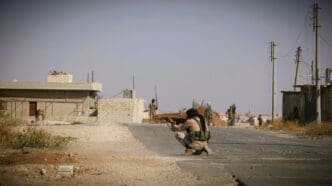The unexpected fall of Bashar Assad in Syria has prompted a reevaluation among Iran-aligned factions in Iraq regarding the withdrawal of U.S. forces from the country, according to several officials from both Iraq and the United States.
In a dramatic shift, Iraq’s political and military landscape is being reshaped by the changing situation in neighboring Syria. The rapid overthrow of Assad by Sunni Islamist rebels in December has left Iranian-backed factions, particularly the Shiite Coordination Framework, reconsidering their demands for the U.S. military exit. This group, which played a pivotal role in bringing Iraqi Prime Minister Mohammed Shia al-Sudani to power, is now confronted with a new geopolitical reality that has weakened Iran’s influence in the region.
A key concern among these factions is the potential resurgence of the Islamic State (IS), should the U.S. forces leave Iraq prematurely. Assad’s fall has created a power vacuum in Syria that could be exploited by IS, a fear echoed by a senior official within Iraq’s National Security Service. “Most leaders of the Shiite Coordination Framework are in favor of keeping American forces in Iraq,” stated an unnamed official from the group. “They are afraid of ISIS exploiting the vacuum if the Americans leave Iraq and the situation in Iraq collapses.”
This concern is shared by a senior U.S. defense official who acknowledged the apprehensions of Iraqi officials over IS potentially taking advantage of the chaotic post-Assad environment. Although no public statements have been issued regarding an extension of the U.S. military presence, Iraqi officials have informally requested a delay in the American-led coalition’s withdrawal. The fall of Assad has underscored the strategic importance of maintaining U.S. forces in Iraq amid ongoing instability in Syria.
Iraq’s leadership finds itself in a challenging position, balancing its ties with both Iran and the United States. The Iraqi government had initially supported the end of the coalition’s mission in Iraq, citing a stable security situation. However, with the regime change in Syria, the rationale for a U.S. withdrawal is being reexamined. The Iraqi government has not yet made a formal request to extend the U.S. military presence, as Prime Minister al-Sudani is cautious about being perceived domestically as retracting his previous stance on U.S. exit.
Historically, Iraqi armed groups have had a complex relationship with U.S. forces. While some groups, such as the Popular Mobilization Forces, cooperated against IS, they have also been known to launch attacks on U.S. bases. With the fall of Assad, these groups appear to have ceased their offensive actions against American forces, perhaps recognizing the shifting dynamics in the region. Renad Mansour, a researcher at Chatham House, highlights the real threat posed by IS in the current unstable Syrian context, emphasizing the need for strategic reassessment by Iraqi leaders.
The regime change in Syria has forced Iraqi factions to reconsider their approach to U.S. military presence. While the initial call for an American exit was based on a perceived stable environment, the volatile situation in Syria and the potential resurgence of IS have necessitated a reevaluation of these plans. The Iraqi government, poised between influential regional powers, must carefully navigate this complex geopolitical landscape to ensure national stability and security.








